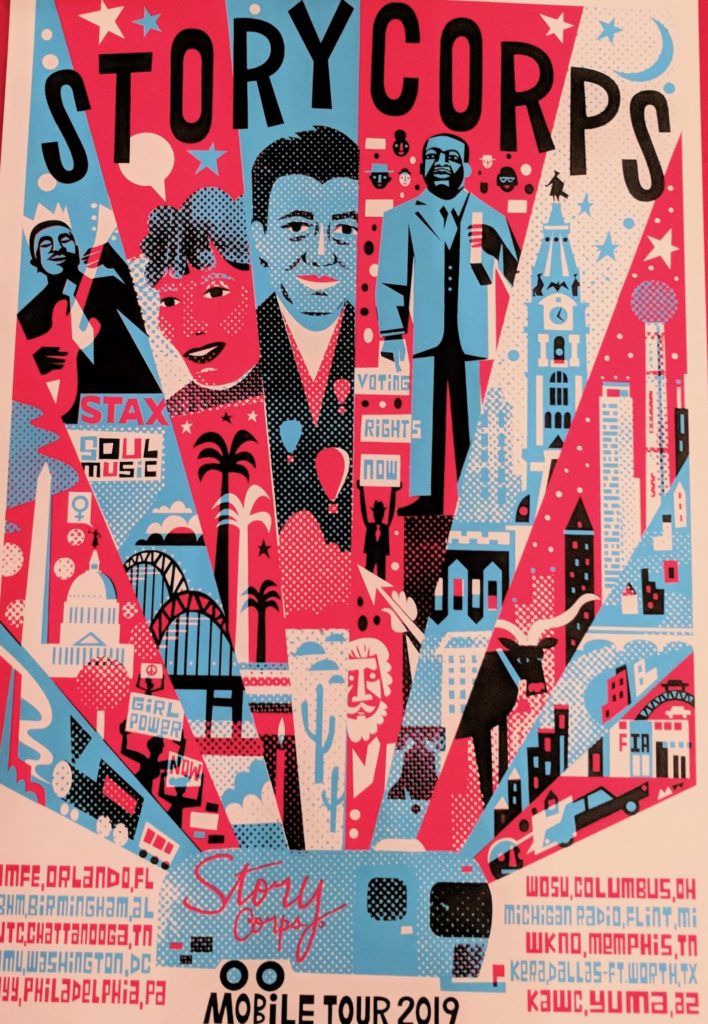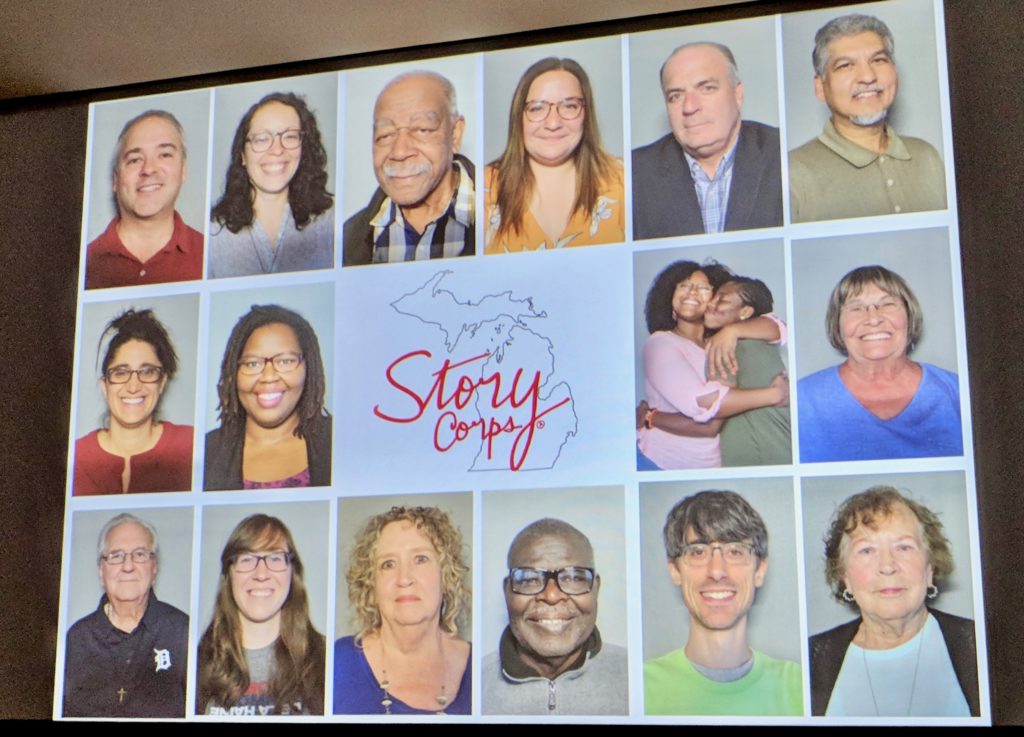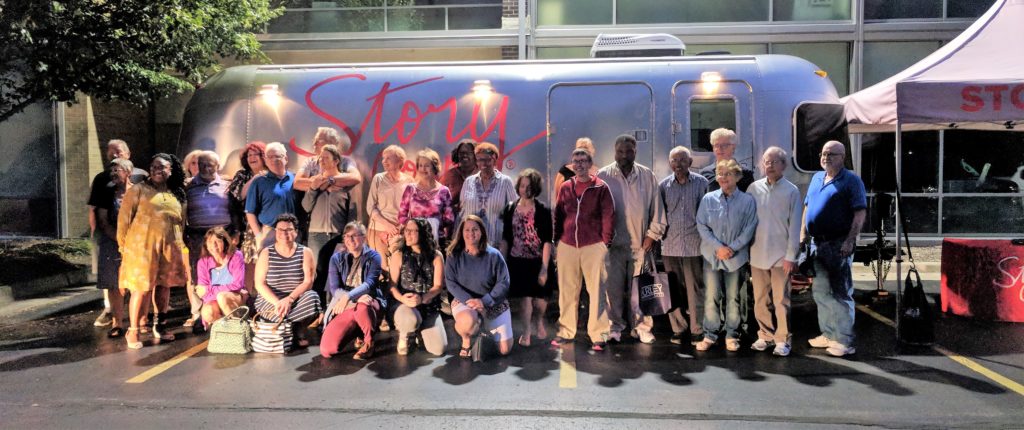By Paul Rozycki
 As the StoryCorps wraps up its month-long stay in Flint, a “Listening Event” at the Flint Institute of Arts Aug. 29 shared remarkable tales of life in Flint:
As the StoryCorps wraps up its month-long stay in Flint, a “Listening Event” at the Flint Institute of Arts Aug. 29 shared remarkable tales of life in Flint:
A story about a woman who met her birth mother for the first time.
A story about an ex-con who turned his life around and is doing the same for others.
A story of a women who interviewed her 96- year-old father recovering from a stroke, who told of growing up and working in Flint a half century ago.
A story of a Jewish teacher at the Islamic Center of Flint and his friendship with his Muslim colleague and the sharing of their respective faiths and cultures.
A story of a wife who hears her husband’s war-time combat stories for the first time.
A story of a man whose father taught him how to lay bricks on Saginaw Street decades ago.
A story of a gay couple’s first date and what grew out of it.
A woman who recalled watching GM’s 50th Anniversary parade in Flint in 1958 who said “I remember seeing the 50th anniversary car in the parade. I don’t recall what kind of car it was, but it was gold.”
A story of a woman who earned a doctorate in psychology, after being inspired by her teacher.
A story of a man who came to Flint in 1958 and had to go to school barefoot at first.
All of those stories, and more, were captured by StoryCorps and retold at the Flint Institute of Arts during its recent “Listening Event.”
Leon El-Alamin, who served time in prison, returned to Flint to found the M.A.D.E Institute, which gives ex-convicts a chance to learn a trade, find a place to live and turn their lives around. M.A.D.E stands for Money, Attitude, Direction, and Education. In his interview he described how his life changed as he “grew up in prison” and how he became committed to “change the lives of those who have been incarcerated.”
Sharon A. Simeon described the 23 years she spent looking for her birth mother, Johnnie Mallet Caruthers, and the joy she felt when they finally met. “I didn’t know if she would accept me,” she said with tears in her eyes. But she said, “She looks at me and goes, ‘yep, you’re part of my family.’”
Anoopa Todd, whose father was interviewed, said the process “taught me how precious time is” and how important it is to connect with those we love as “they tell their own story.”
When members of the audience responded to the program, Susan Steiner Bolhouse offered a suggestion about why preserving the stories is so important.
She said, “for those who are immigrants, the first generation wants to forget the past, the second generation wants to succeed, and the third generation wants to remember their history.” A common format in the Story Corps is for grandchildren to interview their grandparents.

Familiar and less-known faces of the StoryCorps project (Photo of video display by Paul Rozycki)
Speaking to an audience that included many of those who were interviewed over the last month, the leaders of the project explained the history and goals of the StoryCorps project.
Hosted by Jacqueline Van Meter, mobile tour site manager of StoryCorps, and Steve Schram, executive director of Michigan Public Radio, those in attendance learned not only of Flint’s stories but also of the history and goals behind the StoryCorps.
StoryCorps was founded in 2003, with a booth in New York City’s Grand Central Station, with the goal of allowing people to “record and write their own history.” In following years the StoryCorps team launched several mobile booths to gather stories around the nation. Today a StoryCorps app allows anyone to tell their own stories for future generations.
Since its founding StoryCorps has given more than 400,000 people the chance to record their own stories about their lives and pass it on to the next generation as a legacy for the future. The StoryCorps team expects that in the near future all of the collected interviews will be available on their website.

Participants in the Aug. 29 “Listening Event” pose in front of the mobile Story Corps unit (Photo by Paul Rozycki)
The Story Corps Airstream Mobile Booth has been in Flint for more than a month and has recorded more than 100 interviews with individuals and families who wanted to tell their stories about living and growing up in Flint.
Most of the interviews ran for 40 minutes. The Flint stories will be broadcast over the next several months on WFUM (91.1 FM) both as part of their Stateside program, and as a separate StoryCorps program.
Community partners for StoryCorps in Flint were: American Muslim Community Services, North Flint Oral History Project, The Flint Public Library, Michigan Radio WUOM, Flint Islamic Center, the M.A.D.E. project and the Flint Institute of Arts.
Flint is the seventh of ten cities that the StoryCorps will visit this year. After Flint they will visit Memphis, Tennessee, Dallas/Fort Worth, Texas, and Yuma, Arizona.
Traveling around the nation with StoryCorps, Van Meter called it “the ultimate American road trip.” The team will be in Flint until Sept. 5, but they encourage those who would like to contribute their own interviews to visit the StoryCorps website (StoryCorps.org) at any time to share their stories.
EVM political commentator and staff writer Paul Rozycki can be reached at paul.rozycki@mcc.edu.


You must be logged in to post a comment.